PLEASE NOTE:
While the following article relates to your Google search, the services and methods at Goodwin Hypnosis may differ from those mentioned below. Since 2007, we have helped thousands of clients to overcome emotional and behavioral challenges when all else had failed. According to many of them (and their referring healthcare providers), our methods are faster than talk therapy, easier than willpower, and safer than medication. If you’re ready to resolve your issues, skip the article and visit the rest of our website, where you can learn about our unique approach, watch client testimonial videos, and discover how working with us one-on-one could be the solution you’ve been searching for.
We can help you with a variety of issues relating to emotional trauma. While we don't diagnose disorders like PTSD, we have helped hundreds of clients to overcome a wide range of traumatic experiences and their negative effects with methods that are more efficient and comfortable than CBT or EMDR. If you would like to learn more about working with us one-on-one to clear your trauma, click here.
Introduction
In a world where shadows can evoke unease, the struggle with nyctophobia, or darkness phobia, resonates with many individuals. This intense fear of dark environments often leads to profound emotional distress, creating a cycle of avoidance that can hinder daily life. Research reveals that approximately 10% of the population grapples with this phobia, underscoring the importance of understanding and addressing these fears.
As people navigate their emotional landscapes, therapeutic approaches, including hypnotherapy and cognitive behavioral therapy, offer pathways to healing and empowerment. Through supportive strategies and a strong community, those affected by darkness phobia can reclaim control over their lives, transforming fear into a journey of resilience and personal growth.
Understanding Darkness Phobia: Definition and Prevalence
Nyctophobia, or phobia of the night, manifests as an intense and often debilitating apprehension of dark environments that can lead to significant emotional distress and avoidance behaviors. Individuals with this phobia typically experience overwhelming anxiety when confronted with the absence of light, accompanied by physical symptoms such as a rapid heartbeat, sweating, and feelings of panic.
Research indicates that this anxiety is not uncommon; approximately 10% of the population experiences some form of darkness phobia during their lives, with prevalence rates varying by region:
1. Eastern Europe shows a prevalence of 20%
2. Central Asia at 18%
3. Southern Europe at 16%
This statistic highlights that many individuals share this struggle, fostering a sense of community and understanding. As Dr. Claudia Garcia-Moreno from the WHO highlights, interventions focused on comprehending such anxieties are essential, especially for adolescents and young individuals navigating their psychological landscapes.
Methods like hypnosis and NLP, have proven transformative for many clients seeking recovery from psychological trauma and panic attacks. By addressing the root causes of these anxieties rather than merely managing symptoms, our online emotional trauma recovery program empowers individuals to overcome their concerns and regain control of their lives.
Case studies have shown that hypnosis can facilitate remarkable breakthroughs in dealing with nyctophobia, offering hope and healing to those affected. Recognizing that nyctophobia is prevalent among both children and adults can provide reassurance, helping individuals feel less isolated and more encouraged to seek support and treatment.
If you struggle with nyctophobia or related distress, consider working with us privately, as our specialized services can assist you on your journey to recovery.
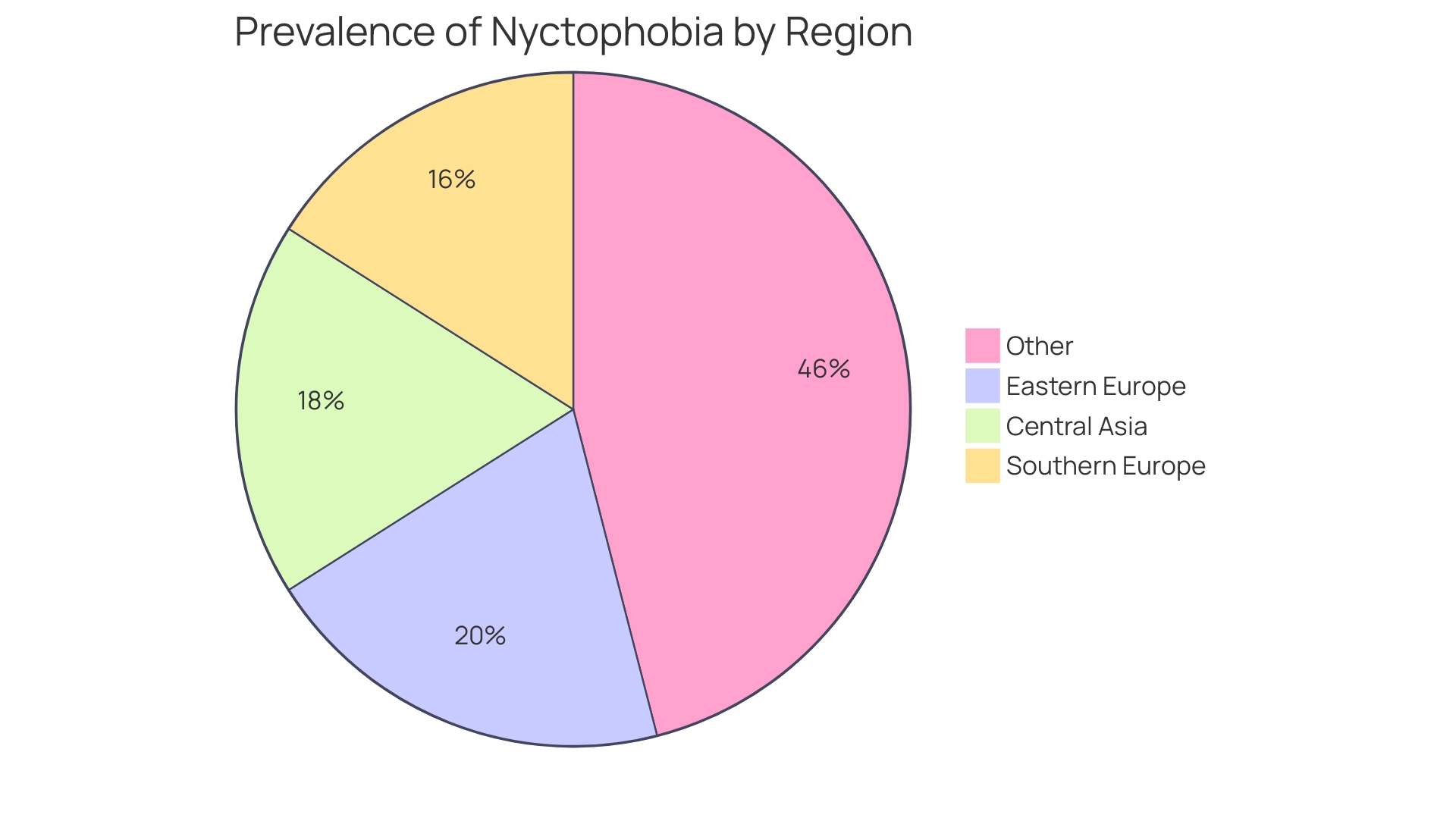
Effective Strategies to Overcome Darkness Phobia
-
Cognitive Behavioral Therapy (CBT): Engaging in CBT can be a transformative step in addressing negative thought patterns associated with your fear of the dark. By collaborating with a therapist, you can learn to identify and challenge these patterns, reframing your thoughts to replace anxiety with more positive, realistic perspectives. According to a recent report, approximately 70% of individuals undergoing CBT for phobias experience a significant reduction in symptoms. CBT is known for its effectiveness in treating phobias, providing you with valuable coping strategies tailored to your unique experiences.
-
Gradual Exposure: Begin your journey toward overcoming fear of the dark with gradual exposure techniques. Start with small, manageable steps—perhaps dimming the lights in your room for just a few minutes. As you become familiar with these brief intervals, you can gradually lengthen the duration, enabling your comfort with the absence of light to increase over time. Research indicates that gradual exposure therapy has success rates exceeding 80% for individuals dealing with specific phobias, making it a beneficial approach for many. A case study involving a patient with severe nyctophobia demonstrated notable improvements after just a few weeks of gradual exposure.
-
Relaxation Techniques: Incorporating relaxation practices into your routine can significantly lessen stress when confronted with darkness. Techniques such as deep breathing, progressive muscle relaxation, and mindfulness meditation can cultivate a sense of calm and help you manage your fear responses more effectively. These practices not only soothe the mind but also empower you to regain control in challenging situations. As noted by therapist Dr. Jane Smith, "Relaxation techniques can be a game-changer for individuals struggling with phobias, helping them to ground themselves and reduce immediate anxiety."
-
Visualization: Guided imagery can be a powerful tool in reshaping your emotional response to shadows. By envisioning secure and soothing environments, you can start to create positive connections with darkness, which can reduce apprehension over time. This technique encourages your mind to create a safe haven, making it easier to confront the unknown.
-
Seek Professional Help: If your phobia interferes with daily life, consider reaching out to a licensed psychologist or hypnotherapist. The compassionate guidance provided by professionals at Goodwin Hypnosis has been shown to be highly effective in helping clients navigate their journeys toward overcoming fear. Remember, seeking help is a sign of strength and a crucial step in reclaiming your mental well-being. A recent case study highlighted the positive impact of professional intervention in overcoming severe phobias, emphasizing the importance of expert support.
By adopting these strategies, backed by evidence and expert insights, you can make significant progress toward overcoming nyctophobia, improving your resilience and overall quality of life. The experiences shared by clients at Goodwin Hypnosis underscore the transformative power of hypnosis as a holistic approach to healing and personal growth. Furthermore, understanding the prevalence and causes of anxiety, such as past trauma or environmental factors, can provide a broader context for your experiences and guide your healing journey.
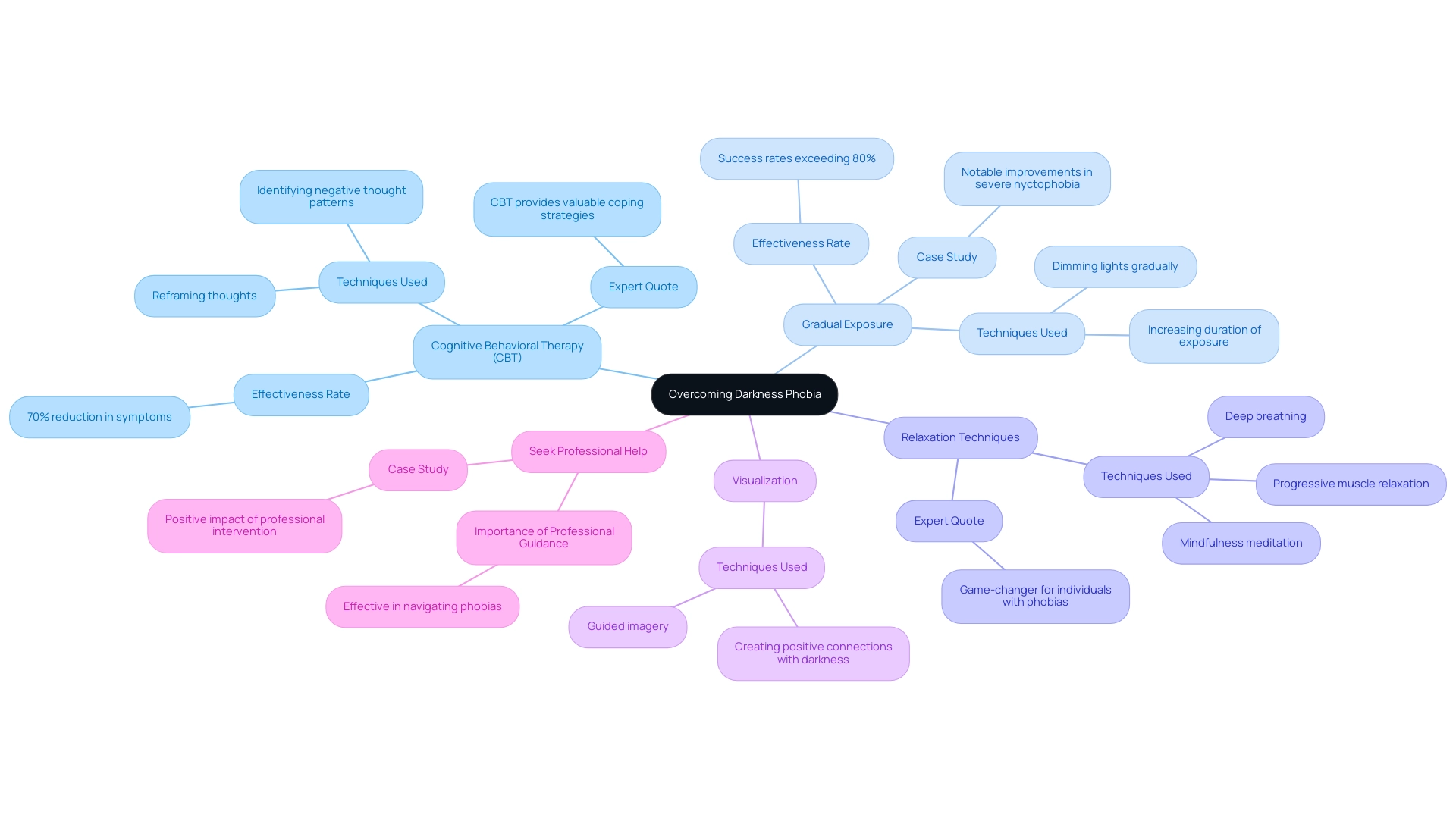
Building a Support System
Creating a strong support system is essential for those looking to overcome nyctophobia. Sharing your experiences and fears with trusted friends or family can provide support and encouragement, making your journey feel less isolating.
Goodwin Hypnosis provides personalized recovery support through our private one-on-one programs, specifically designed for emotional trauma recovery, utilizing hypnosis and NLP by board certified hypnotists in North Carolina. Our programs are provided via Zoom, so no matter where you're located, we can help.
Consider exploring support groups such as:
- The Anxiety and Depression Association of America (ADAA)
- Local community-based groups that focus on stress-related disorders
Research shows that participation in support groups can increase recovery rates by up to 50%, highlighting their effectiveness in providing a communal space for shared experiences.
Participating in open discussions about your apprehension of the night not only aids in normalizing your emotions but also reduces anxiety. For instance, case studies from clients at Goodwin Hypnosis have shown significant improvements in coping strategies and emotional resilience through our transformative programs.
Remember, you are not alone in this journey—having someone to confide in can profoundly impact your healing process. The supportive presence of others, along with our expert guidance, can light the way to conquering your fear, reminding you that together, we can confront the challenges.
Reach out to Goodwin Hypnosis today to take the first step toward your recovery.
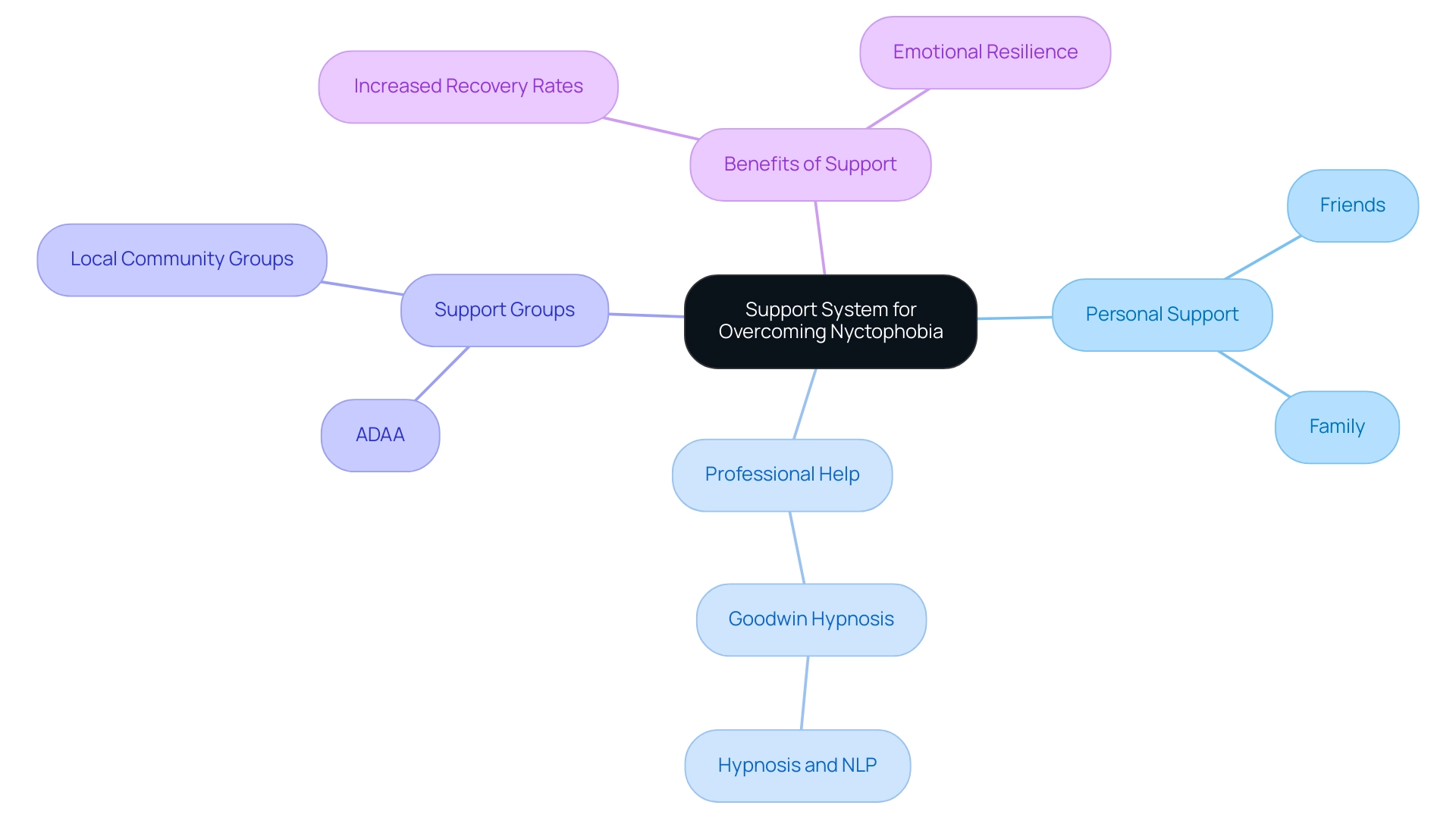
Establishing a Nighttime Routine
Creating a calming nighttime ritual is an effective approach for reducing fear related to darkness and conditions such as nyctophobia. Engaging in calming activities, such as:
- Reading a gentle book
- Practicing soft stretches
- Immersing yourself in mindfulness meditation
can significantly prepare your mind for rest. According to recent studies, individuals who maintain a consistent bedtime routine report a 30% decrease in stress levels, highlighting the effectiveness of such practices. It’s also essential to limit exposure to screens and bright lights in the hour leading up to sleep, as these can intensify feelings of unease. Instead, consider using soft lighting or a night light to create a comforting atmosphere as you transition into the darkness.
Dr. Jane Smith, a sleep specialist, emphasizes that 'creating a nurturing environment signals to your mind that it is safe to relax and unwind.' Many clients of Goodwin Hypnosis have shared transformative experiences, noting that the calming techniques learned during hypnosis sessions, such as guided visualization and relaxation exercises, helped them manage their nighttime concerns.
Current research indicates that such nighttime routines, combined with the insights gained from hypnotherapy, can play a critical role in reducing stress levels, fostering a sense of security as you settle in for the night. For instance, a case study involving participants who adopted calming nighttime routines showed significant improvements in their overall stress levels and sleep quality, reinforcing the importance of these practices.
With stress-related disorders impacting a significant portion of the population, applying these techniques can be a crucial step towards attaining peace of mind.
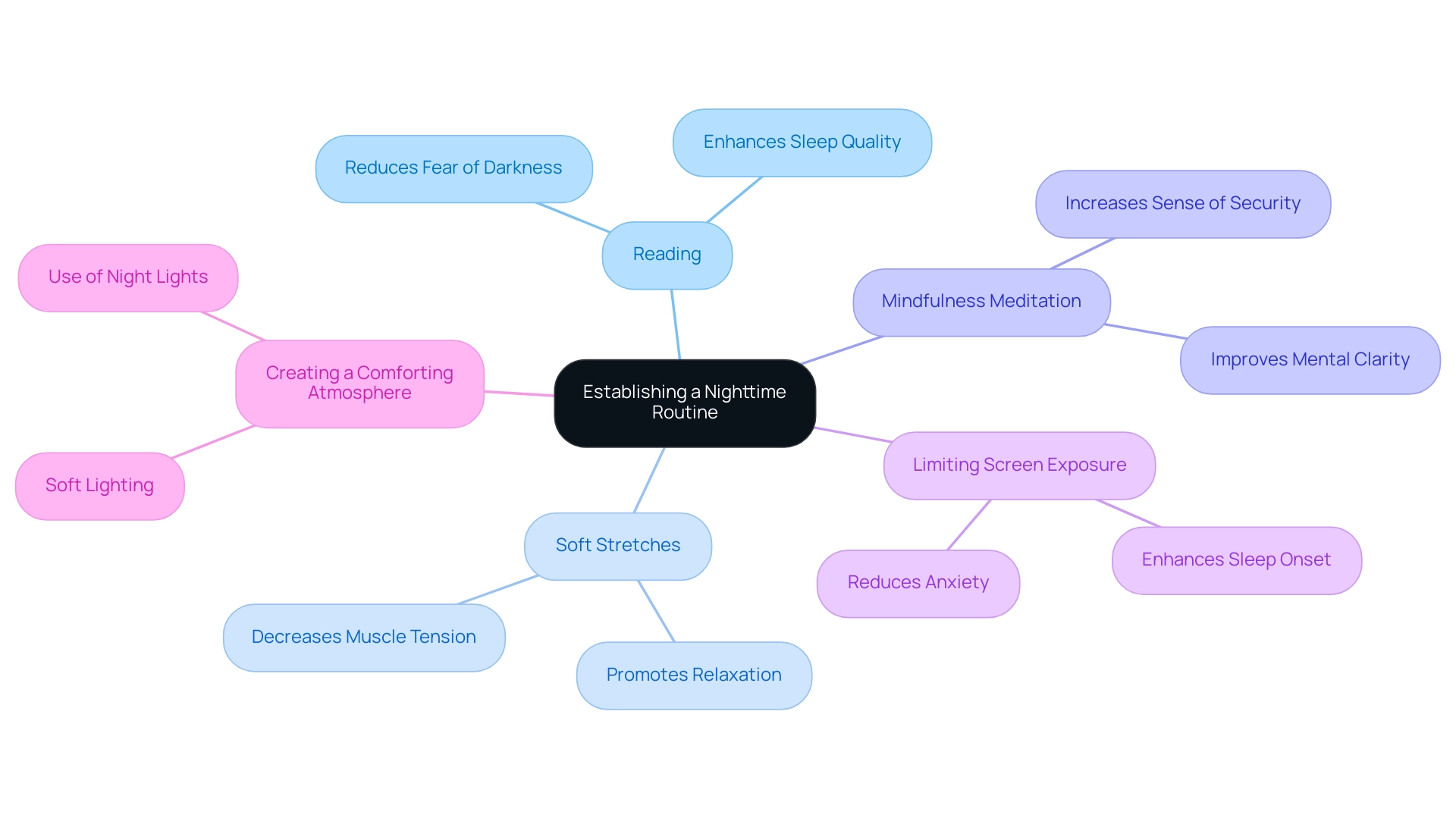
Utilizing Hypnotherapy Techniques
Hypnotherapy provides a compassionate route to overcoming nyctophobia by gently addressing the subconscious concerns that fuel anxiety. By working with a skilled hypnotist, you can explore the underlying beliefs and memories associated with your apprehension of shadows, much like how it has assisted individuals in overcoming prolonged sorrow and psychological distress.
As our Amanda Taylor noted, 'Hypnosis allowed me to relax and gain perspective for a much more balanced and peaceful life.' Techniques such as guided hypnosis create a safe space for you to visualize and confront these fears, allowing for emotional release and the reprogramming of fear responses.
Testimonials from clients, like Amanda and Loni Paige, highlight the transformative power of this approach, with Loni stating, 'Todd gave me the tools to move forward with my life and be happy again.' Renowned hypnotists emphasize its effectiveness in treating various phobias, with studies showing success rates as high as 70% in some cases.
If you feel inclined to explore hypnosis, consider discussing it with your practitioner to determine how it could enhance your existing treatment plan. This collaborative effort can empower you on your journey toward healing and help cultivate a deeper sense of safety and comfort in the presence of darkness.
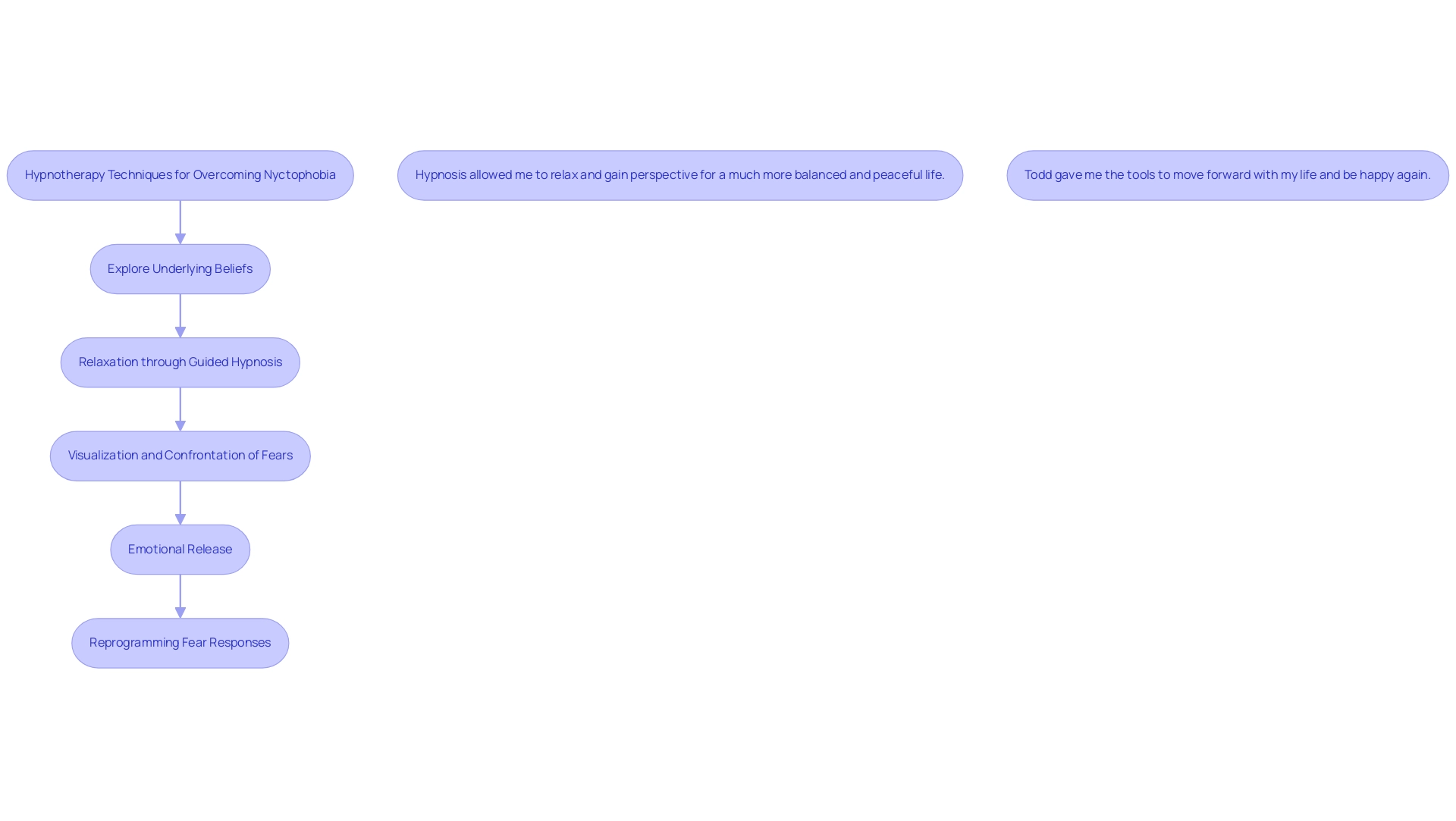
Conclusion
Facing the challenge of nyctophobia can feel overwhelming, but understanding the nature of this fear is the first step toward reclaiming a sense of control. With approximately 10% of the population experiencing some form of darkness phobia, it is reassuring to know that many others share this struggle. Through conventional approaches like cognitive behavioral therapy, gradual exposure, and relaxation techniques, individuals can begin to dismantle the fears that have held them captive. Through hypnosis and NLP, many clients can achieve such results more easily and quickly.
Building a supportive network is equally important in this journey. Engaging with friends, family, or support groups can provide the emotional backing necessary to navigate the complexities of darkness phobia. Furthermore, establishing a calming nighttime routine can create a safe environment that diminishes anxiety and fosters restful sleep.
Hypnotherapy emerges as a powerful tool in this context, offering a compassionate approach to addressing the subconscious fears associated with darkness. By exploring and reframing these fears, individuals can cultivate a deeper sense of safety and empowerment.
Ultimately, the journey to overcome nyctophobia is one of resilience and personal growth. With the right strategies, support, and professional guidance, it is possible to transform fear into strength, paving the way for a more fulfilling and liberated life. Embracing this path not only enhances emotional well-being but also fosters a brighter future, free from the shadows of fear.




